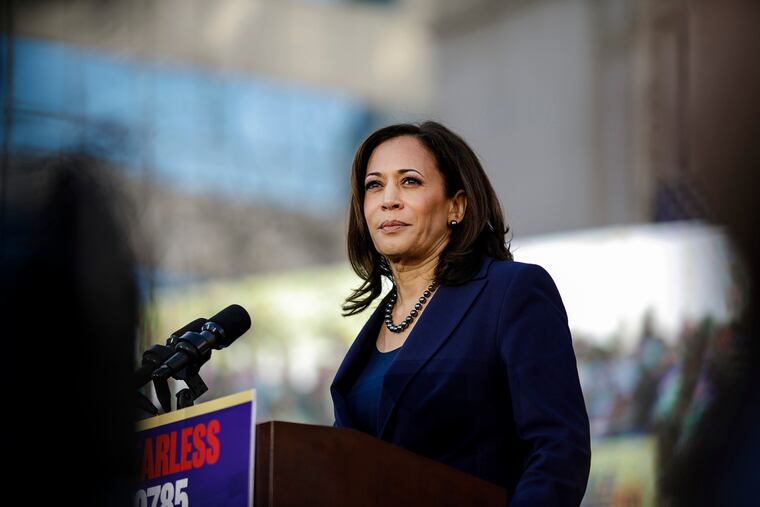‘Medicare for All’ is not the only way to insure everyone
Senator Kamala Harris (D., Calif.) caused quite a stir when she said during a CNN-televised town hall in Iowa that she favored replacing private health insurance with a “Medicare for All” plan.

Senator Kamala Harris (D., Calif.) caused quite a stir last week when she said during a CNN-televised town hall in Iowa that she favored replacing private health insurance with a “Medicare for All” plan. Harris, who announced she was running for president days earlier, engaged in this exchange with CNN’s Jake Tapper:
Tapper: I believe it will totally eliminate private insurance. So for people out there who like their insurance, they don’t get to keep it?
Harris: Well, listen, the idea is that everyone gets access to medical care, and you don't have to go through the process of going through an insurance company, having them give you approval, going through the paperwork, all of the delay that may require. Who of us has not had that situation, where you've got to wait for approval, and the doctor says, well, I don't know if your insurance company is going to cover this? Let's eliminate all of that. Let's move on.
Senator Harris is hardly alone in calling for private insurance to be replaced by a national single payer plan (often called Medicare for All). According to CNN, “That includes Harris, as well as Sens. Kirsten Gillibrand (New York), Elizabeth Warren (Massachusetts) and Cory Booker (New Jersey) -- not to mention Sanders, who is likely to also join the race.”
While there are strong arguments for a single payer system without private insurance — principally, that it would be the most direct way to cover everyone, with fewer administrative costs and lower overall costs — candidates (and voters) might be well-advised to step back for a moment and consider that single payer is not the only way. There are other ways that could achieve much of the same, potentially with less disruption (most Americans now get their coverage from private insurance), less resistance to such disruption from people who would fear losing their current coverage, and less opposition from powerful interests.
Consider:
1. While the United States is the exception among wealthier industrialized nations in not having universal coverage, most of the other countries with universal coverage are not single payer systems. The Commonwealth Fund reviewed the health systems in 19 countries that have universal coverage--one in which everyone — regardless of their ability to pay — has access to essential health services-- and found that there is “a range of different paths to universal coverage, from government-financed and -run approaches to largely employer-financed systems administered by insurance companies.” The countries generally fell into three categories, Commonwealth found: predominantly public insurance (such as England’s National Health Service or Canada’s “Medicare” system), regulated private insurance (such as the Netherlands), and mixed public-private insurance (such as in France). Commonwealth’s bottom-line: “Universal coverage can be achieved in many ways.”
2. Completely eliminating private insurance in the United States would require hundreds of millions of people to replace their current coverage with the public plan, whether they want to or not, and threaten an entire industry and its off-shoots. Medicare-for-All would in effect “remove private health insurance from the estimated 251 million Americans who use it, broadly disrupting the industry and the way Americans experience the medical system” notes the Washington Post, and put at risk the jobs of the “roughly 512,000 Americans work directly for health insurance companies and another 908,000 work in closely related industries.” A recent poll administered by the Kaiser Family Foundation (KFF) found that while a majority of Americans support Medicare-for-All, most incorrectly assume that it would allow them to keep their private insurance; support for Medicare-for-All drops from 56% to 37% when respondents were told they would lose their private insurance.
3. Offering everyone the option of enrolling in a public plan like Medicare, while allowing them to keep private insurance if they want, could achieve universal or near-universal coverage, with less disruption than a pure single payer plan. The same KFF poll found that 74% of respondents favored “creating a national government administered health plan similar to Medicare open to anyone, but would allow people to keep the coverage they have” compared to 56% in favor of “having a national health plan, sometimes called Medicare-for-All, in which all Americans would get their insurance from a single government plan.” A variety of proposals, think of them as being “Medicare-for-All-Who-Want-It” (admittedly, a mouthful to say compared to Medicare-for-All), have been proposed that would create such a “public option” without prohibiting private insurance, such as the Medicare X plan proposed by Senators Michael Bennett (D-CO and Tim Kaine (D-VA).
Medicare-for-All it may be the most efficient and effective way of achieving universal coverage at less cost and complexity, but it would also be the most disruptive. Offering Americans the choice of enrolling in a Medicare-type plan could achieve much of the same—one could envision, over time, that the role of private insurance would shrink as more enrolled in the public plan. As long as the result is as system where everyone — regardless of their ability to pay — has access to essential health services (universal coverage) it would be a big improvement over the current system that, even with the gains in coverage from the Affordable Care Act, leaves millions without affordable coverage.
Robert B. Doherty is senior vice president of governmental affairs and public policy for the American College of Physicians.